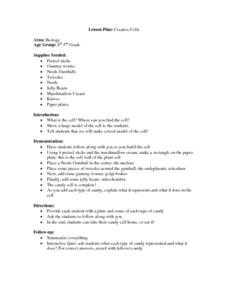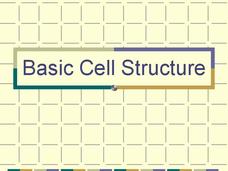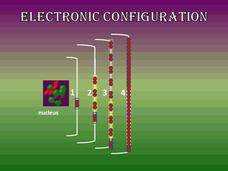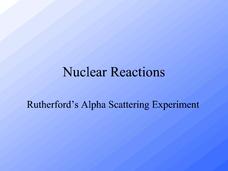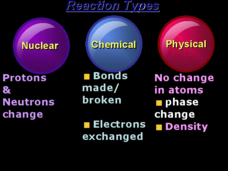Curated OER
Biology: Creative Cells
Students use various snacks to make large models of human cells. Items such as gumballs, gummy worms, and jelly beans represent the nucleus, golgi bodies, and mitochondria. As each piece of candy is added, the teacher explains what it...
Curated OER
Create a Cloud in a Bottle
Students observe an experiment showing the formation of a cloud. They write a paragraph summarizing the condition that are necessary for a cloud to form and explain the weather situations cause cloud formation.
Curated OER
Bio Vocab Unit 2 Word Search Puzzle
In this biology vocabulary word search instructional activity, students will find and circle 15 words or phrases such as "nucleus" and "metabolism".
Curated OER
Deep Impact Comet Encounter
Physics apprentices analyze the impact of NASA's Impactor as it collided with the comet Tempel 1 in July of 2005. They calculate the mass and speed of the comet, along with the distance it might drift off of its orbit over time. This...
Curated OER
Basic Cell Structure
Initially, general details about cells and single cell organisms are provided. Next, the concentration becomes cellular processes such as respiration, osmosis, diffusion, fission and mitosis. This is an attractive PowerPoint which...
Curated OER
Electronic Configuration
The creator of this collection of chemistry slides is clever! Electron configuration is explained as, click-by-click, orbitals are displayed and then each is subsequently filled with the proper amount of electrons. After the progression,...
Curated OER
Living Systems Part III
Here is a fantastic, informative, interactive presentation on plant and animal cells. The PowerPoint is produced by an elementary school teacher who has a doctorate in science, and it shows! This would be a splendid presentation to use...
Curated OER
Nuclear Reactions - Rutherford's Alpha Scattering Experiment
Neat! Show your physics class exactly how Ernest Rutherford fired alpha particles at a piece of gold foil and so determined that most of an atom is composed of empty space. Not just a slide show, but almost an animation, this...
Curated OER
Chemistry Slide Collection
A huge slide show provides a review of almost every topic there is to cover in basic chemistry! Your young scientists will be interested to see each illustration and example given. The appearance of the 120 slides varies greatly, most...
Curated OER
Atomic Musical Chairs
An engaging activity enlightens young chemists in this lesson on atomic structure. They play musical chairs through a series of concentric circles that represent electon orbitals. A laundry basket in the middle holds the protons and...
Curated OER
Protists - The Protozoans
Five pages provide thorough coverage of three protozoans: euglena, amoebae, and paramecia. For each, junior biologists read factual text, label the organism, and write answers to several questions. This neatly organized assignment is...
Curated OER
How Do Antiretroviral Drugs Work?
In this biology worksheet, students watch a series of videos and complete 10 short answer questions right after. They explain how ART drugs interrupt the life cycle of HIV.
Curated OER
Fungi
Why did the mushroom go to the party? Because he was a fun guy! Biology learners study fungi while completing this worksheet. Structure is compared to that of other life forms. The life cycle is displayed with colorful diagrams for...
Curated OER
History of the Atom
This is a tremendous overview of the tiny atom. Journey through the history of human understanding of this basic building block of matter. Examine each of the sub-atomic particles in detail: neutrons, protons, electrons, quarks. Peruse...
Virginia Department of Education
Prokaryotes
Lead your biology class on a cell-sized adventure! Emerging scientists construct models of prokaryotes, then design an experiment to properly grow a bacterial culture. They conclude the activity by viewing the culture under a microscope....
American Chemical Society
Finding Volume: The Water Displacement Method
We have formulas for finding the volume of geometric shapes, but what if the shape is irregular? Lesson describes how to find volume through water displacement. After a demonstration, scholars practice in small groups. Then analysis...
Curated OER
Build Your Own Cell
For this building your own cell worksheet, students identify cell vocabulary and facts, and create posters of a labeled plant cell and an animal cell. In this fill-n-the-blank and posters worksheet, students provide twenty-three answers.
Shelby County Schools
Atomic Structure Worksheet
Teaching young scientists about atoms is no small task, but this series of worksheets will make it a little easier. From creating and labeling Bohr models, to identifying information provided in the periodic table of elements,...
American Museum of Natural History
Light Quest
Grab a partner and shed some light on light. A remote learning resource has scholars play a board game to answer trivia questions about light. They also read about how Einstein contributed to the understanding of light as both a wave and...
Curated OER
Tour of the Cell 1
Each of these slides deals with an individual organelle and displays a diagram along with labels of the structures. The most useful components of this slideshow are the summaries of functions and descriptions of how the organelles are...
Howard Hughes Medical Institute
Central Dogma and Genetic Medicine
Scientists work every day to find solutions to genetic diseases. Scholars learn about the process of gene sequencing, mutations, and the results. They explore genetic diseases and therapies to intervene and help and, through case...
It's About Time
Chemical Names and Formulas
Abracadabra! Provide your class with the tools to perform a chemical "magic show" as they predict the charges of various ions, determine ionic compound formulas, and make observations to determine when a chemical reaction between...
Science Geek
Periodic Trends
If your pupils think Um is the element of confusion, this presentation on period trends can only help. It covers the patterns for atomic radii, ionization energy, and electronegativity across a period and down a group.
National Energy Education Development Project
Introduction to Solar Energy
People have been using solar energy for many generations to dry crops, heat homes, and for light. This presentation explains how now it is possible to capture the solar energy and store it for future use, details how and where...
